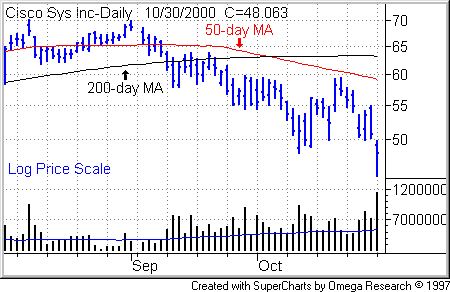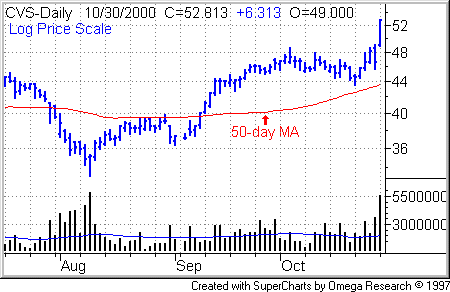Bargain Hunters Negate Short Sale
Caution and cash remain the watch words
for the intermediate-term trader. With few exceptions, Monday’s news movers came
in sloppy price-and-volume patterns that offered poor probability trades on
either the long or short ends.
Cisco Systems
(
CSCO |
Quote |
Chart |
News |
PowerRating) gapped down
Monday and gave up 10.7% intraday before paring losses to close down 2 5/8 (or
5.2%)Â to 48 1/6 on double average volume. This is an example of a stock
that does not qualify for a gap-down
short. True, the stock gapped down on negative news, volume swelled
well above daily volume averaged over the past 50 sessions, and the share price
closed below the stock’s 50- and 200-day moving price averages.
However, the stock did not close in
the bottom half the day’s range. Instead, Cisco shares closed in the upper 38%
of the day’s range. The indicates that institutions stepped in to accumulate
shares. On a gap-down short, you want no bargain hunters. You want remaining
shareholders in pain and in panic and everyone else too scared to come near the
buy side of the stock. At minimum, that requires a close in the bottom half of
the range, the lower the close the better.
Cisco also closed above its Volume
Weighted Average Price (VWAP) of 45.507, another sign buyers got the upper hand
over sellers by the end of the session. So while the stock is clearly in trouble,
the bearish factors don’t line up enough to make for a high probability short
trade.

Cisco fell on a Lehman Brothers report that said the maker of routers could be hurt by slowed spending by telecom companies.
I prefer to short news movers when the negative news comes directly from the
companies. How often have we seen dueling analyst opinions? But when a company
runs up the white flag, you can have more confidence in the bearish fundamental
outlook.
One of the few robust-looking
breakouts came from CVS Corp.
(
CVS |
Quote |
Chart |
News |
PowerRating). The nation’s second largest drugstore
chain by sales reported third quarter earnings of 39 cents a share vs. 30 a year
ago and analyst estimates averaging 35 cents, according to First Call/Thomson
Financial. Sales rose 14% to $4.9 billion.

